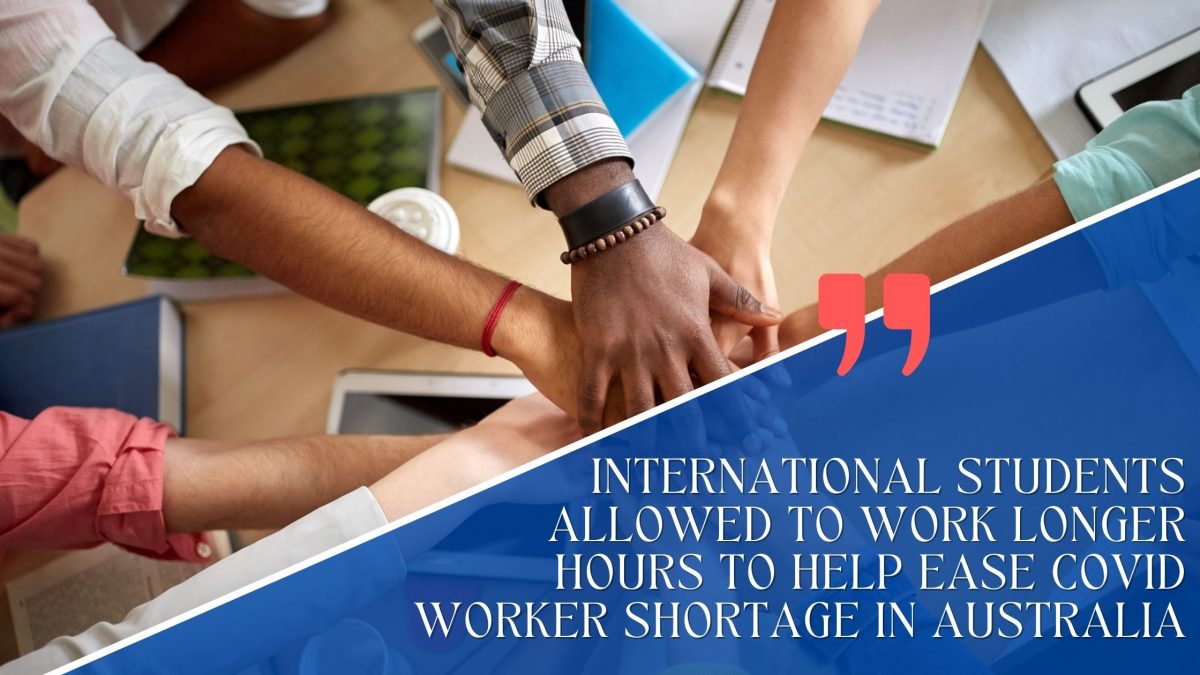The Australian government has taken steps to ensure that foreign students are able to pick up more hours, in order to help alleviate worker shortages as people are forced into isolation due to the Omicron COVID-19 outbreak.
The Prime Minister of Australia has announced the federal government will no longer restrict student visa-holder workers to 40 hours per fortnight. The decision means they can work as many hours as they need without restriction.
In May last year, the forty-hour work limit for international student visa holders in the tourism and hospitality industry was lifted.
If you are an international student who wants to relocate or stay in Australia after finishing school, this is the perfect opportunity for you since one prerequisite in getting a permanent visa is having more work experience
One of the prerequisites to get a permanent visa is having one skill that is in demand in the Australian market. Australian businesses are always looking for skilled workers that can fill their vacancies, so it would be best if you looked into what type of skills they need and see if it matches your qualifications and if you have enough points to be granted a permanent visa.
We are working with employers who are looking for skilled workers, feel free to contact us and our migration consultant would be happy to assist you.
In line with this, Mr Morrison encouraged international students to return to Australia, and backpackers are also allowed into the country under working holiday visas. This is so long as they are fully vaccinated.
Recently, there has been a huge worker shortage in the food distribution and manufacturing industries because many workers have had to isolate themselves due to an outbreak of coronavirus cases.
Emergency services and food distribution workers in New South Wales and Queensland who are close contacts can leave isolation to go to work as long as they don’t show any symptoms.
Anyone who is living with a positive case of COVID-19 must take a rapid antigen test every second day until the sixth day following the time they went into isolation.
As of Wednesday next week, Victorian workers in emergency services, education, custodial facilities and transport will be exempt from isolating as close contacts if they are deemed crucial to the safety of other people. This expansion is coming on top of an already existing exemption for healthcare workers and food distribution employees.
Australia’s top health panel has suggested that state and territory leaders consider expanding the number of workers permitted to leave self-isolation.
International students are welcoming the decision.
Malvin Geonardo is an Indonesian student studying human resources management, and he works as a part-time bricklayer in Sydney.
He said he was delighted to hear that restrictions on working will be lifted.
He’s been working at the bricklayer company for 20 hours per week for the past two years..
“I’m happy with this new regulation because this means that my [international student] friends can work longer hours and I don’t need to cover too many things at work,” he said.
“Since the labour shortage, I’ve been doing extra work so it’s good to know that those jobs will be handled by other people.”
He said that many workers who were from Sydney’s first lockdown have returned to their home country, which means his company has been struggling to find new workers.
The ABC reports that the Australasian Convenience and Petroleum Marketers Association (ACAPMA) CEO Mark McKenzie told them this decision was good news for petrol-station owners.
“The extension of visa hours would provide a major relief in a pressure point we currently have in our workforce,” Mr McKenzie said.
He said that between 10 and 12% of workers in the petrol retail industry are isolated because of COVID-19, about half with coronavirus and the other half because they were close contacts.
“The situation in the fuel industry is very different to the grocery industry. What we’re doing is we’re managing the issue as it currently stands with a small outage in the workforce.”
Decision could put more pressure on international students
Oscar Zi Shao Ong, president of Council of International Students Australia (CISA) said many students would welcome the government’s decision.
He also said that international students already spend up to 40 hours a week at university, attending lectures, tutorials and working on assignments.
He said that adding more work to international students, who are already struggling with university deadlines, would only put pressure on them.
“The biggest question is that international students came here to study,” Mr Ong said.
“If you’re asking them to be entirely just working as a skilled worker, then the question is should they get a different visa rather than student visa?”
He said that international students may not be aware of the changing rules and studies requirements, particularly new arrivals who have come to Australia recently.
“I think it’s a very dangerous situation for them because they won’t be having the correct advice,” he said.
He said that getting international students to work more could put them at a higher risk of catching COVID-19.
“Then who’s going to be responsible to take care of them, if international students fall sick?”





